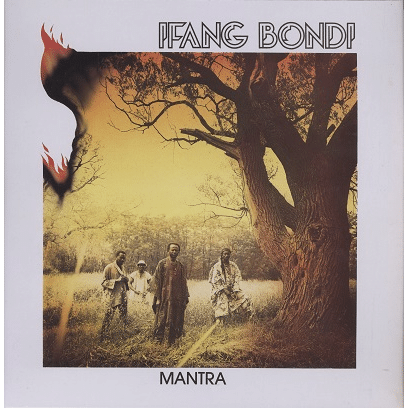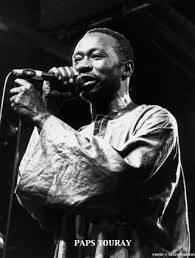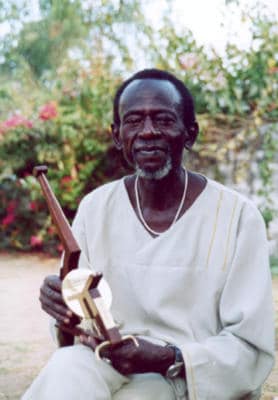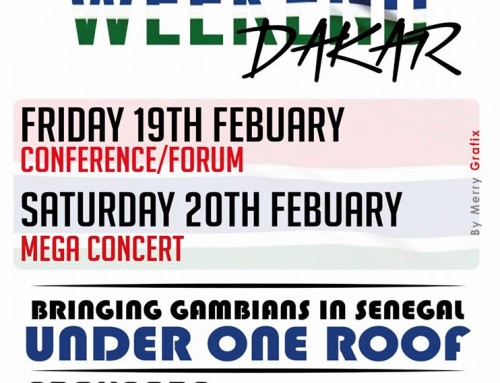FROM STARS TO ROOTS
In actual fact, leader BADOU JOBE and vocalist PA TOURAY had taken a deliberate decision to end Super Eagles at the height of their popularity. Being true revolutionary pan-Africanists and musical pioneers, they had become increasingly disturbed by the music they were playing and the image they presented, despite the greater fame and fortune that was theirs for the taking. They radically gave it all up to go back to square one, back to the roots, to create something African for Africans, to challenge the cultural imperialism of the west which still gripped the continent.They went into the bush to sit at the feet of the griots – the master drummers and the old maestros of the kora, xalam, balafon – the guardians of a thousand years of culture and tradition. After two years of exhaustive research and hard practice, Badou Jobe and the few musicians like Paps Touray, Ali Harb, Karamo Sabally who had felt inspired to join, came back with a unique new music, born from their amazingly rich heritage. To their modern electric outfit, including the novelty of an electric organ, they had added traditional drums which, next to the drumkit’s chromium sheen and the fancy sunburst of the guitars, looked like alien objects from another planet.The new repertoire, painstakingly composed according to the rules of their griot teachers, had meant a struggle with unfamiliar scales and mind-boggling rhythm structures. They proudly coined their music the AFRO MANDING SOUND after the legendary Manding empire, cradle of their West African culture.By 1973 the group had shed their eagles’ feathers to reappear as IFANG BONDI (‘Be yourself’), a fearsome Mandingo spirit which puts the newly initiated to the test and seeks out evil-doers within society.
The band’s first public performances were greeted with dismay and disbelief by their erstwhile devoted fans, who were outraged by the ‘bush’ sound of mbalax and jambadongo rhythms – even stoned the band although the musicians had been careful to hide the sabar (drums) under the British flag.
But bandleader Badou Jobe, veteran of an earlier battle against caste taboos to become a musician in the first place, stuck by his guns through the sticks and stones of this initial period. The only support at the time came from fellow musicians, later to form Toure Kunda and Super Diamono, who appreciated the Afro Manding Sound for the momentum it was bound to give to African music.The greatest accolade however came from kora maestro SOUNDIOULOU CISSOKO himself who considered Ifang Bondi the only contemporary group worthwhile listening to.
Gradually their revolutionary ideas got accepted, and this was the birth of the popular West African modern music – the Afro Manding sound – that has since catapulted Toure Kunda, Youssou N’Dour, Mory Kante, Baaba Maal onto the world stage.
The role of Ifang Bondi has been pivotal – by rehabilitating the traditional musicians they made people aware of their own heritage, and they offered new dimensions to African artists in search of an authentic sound.
Says Senegalese diplomat Abdoulaye Kebe, in African All Stars’ by Chris Stapleton, “The Ifang Bondi sound started it. People went mad when they heard it. Before that, bandleaders used to despise griots and players of traditional instruments. Now they would run behind them and ask ‘Please come and join my band’.”
To rigorously deprive a devoted public of their pop idols, the ultimate symbol of modern western culture; to induce them to set their own cultural values and to get rid of the inferiority complex, a lingering legacy of colonialism, had not been a venture for the faint-hearted.
But in the end the effort proved to be worthwhile. Ifang Bondi have achieved their goal – to create something African for Africans – beyond expectations. Badou Jobe’s innovative ideas, based on a vast musical knowledge, have crystallized into a comprehensive artistic concept, which created also the inimitable sound, Ifang Bondi’s trademark.
Throughout the years, Ifang Bondi have continued to develop their unique music which reflects the enormous variety and richness of authentic styles, be it Wolof, Mandingo, Fula, Jola or other. The band’s line-up shows a similar ethnic diversity.
They put fresh blood into musical traditions, not only by a prolific output of original material but also by organizing festivals in which they invited pop, jazz and reggae musicians from as far as the US and Jamaica to play with traditional performers.From the beginning Ifang Bondi have always had a solid cult following. Notably among Afro-American musicians they have a formidable reputation as an essential roots band, cherished as musicians’ musicians.
The infrequency of their record releases, all sought-after collector’s items, plus the enigmatic personality of their bandleader, who seems to be quite happy to stay out of the limelight (“I once opened the door to the hell of stardom, had a good look around, and slammed it shut again”), has only enhanced the mystique surrounding this group.Meanwhile their albums and regular extensive tours of Europe have given Ifang Bondi an international audience.
1994, London – Light-years away from my Ghanaian students’ days and the Super Eagles rave, I am listening to their album ‘Daraja”. I am awed by the power of this uncompromising African music. It makes abundantly clear that Badou Jobe is one of the greats, as an inspired bandleader as well as a composer and producer of his work. Not only is ‘Daraja’ a wonderful album – a wealth of beautiful arrangements, spellbinding grooves, vibrant voices, intriguing acoustic interludes – which music that keeps growing on you. It is also a celebration of twenty years of Ifang Bondi, featuring the essence of West African music.
The story continues. They are a legend and a living institution. Ifang Bondi continue to be the unchallenged forerunners in the field.
Charles Easmon
ABOUT THE MUSIC
Ifang Bondi are undeniably one of West Africa’s most authentic groups, deeply rooted in tradition. True to their name ‘Be yourself’ they don’t blend their music with any other, for instance western styles.
Their homeland The Gambia is quite unique in a sense that, though living together for centuries, each of its many ethnic groups (some dozen altogether) have stuck to their own music traditions.This explains the bewildering diversity in styles, instruments and repertoire. Besides a wide range of drums there is an abundance of melodic instruments like balafons (xylophones), flutes, violins, with plucked instruments prevailing: over 10 different types are used in The Gambia of which the 21-stringed kora (harp-lute) is by far the most well-known.
As for vocals, about every conceivable genre has been tackled, from searing falsettos, stunning harmonies, galvanic raps to superbly refined almost academic techniques.
The extrovert WOLOF music is mostly known for its exhilarating percussion and spine shivering vocals. The soulful salaam, a 5-string guitar common throughout the region, is used to accompany more reflective songs.A highly fusioned form of the music, with r&b or reggae influences, named ‘mbalax’ after its main rhythm, has become popular especially among Senegalese groups.
The sophisticated MANDING music, based upon the versatile kora and balafon, marries instrumental virtuosity to emotive vocal expression. There exists a vast classical repertoire, tracing back to the 13th century.Westernized adoptions, mostly by Malian and Guinean artists, are scoring high in the international music scene.
The JOLAS’ unyielding sense of independence and individualism reflects in their bold rhythms and compelling vocals. The bugarabu, a unique 4-piece tonal drum set, with its percussionist playing simultaneously melodies and rhythms, provides a showcase for spectacular performances. Outside the region (The Gambia, Casamance) their music is hardly known.[quads id=2] The haunting music of the FULA (Peul) evokes the vast Sahelean plains these nomads have been wandering for thousands of years. Out of their travelling kit, holding just a husky flute, a 1-string violin and half a calabash for a drum, they create music of a mathematical austerity.
Each of Ifang Bondi’s compositions highlights the features of each specific style. The rich texture of the music is achieved by orchestral transcription of relevant instruments, for example the kora, the xalam or the balafon, exploring the full scope of the melodic and harmonies structures.
The underlying polyrhythmic patterns give the music its typical hypnotic drive, while the tonal qualities of the drums are distinctly integrated in the melodic make-up.
Mandingo and Wolof tunings are based on heptatonic kopra reps. xalam scales, the intervals of which are quite different from common western scales. Fula an Jola songs are mostly based on a pentatonic scale.
The eclectic use of modern electric instruments proves a perfect vehicle to win over a young African public brainwashed by western sounds and quite oblivious of their roots. It definitely contributes also to a greater accessibility and appreciation of audiences otherwise unfamiliar with traditional West African music.
The contemporary music of Ifang Bondi is a vivid tapestry of subtle tones and striking arrangements, which doesn’t fail to make an immediate impact by the strong vitality it exudes.
© A. Jobe – all rights reserved
IFANG BONDI MUSICIANS
Bandleader-composer-musical director:
Badou Jobe
Lead Vocals:
Paps Touray (†)
Ali Harb (†)
Sheikh Samba
Alhadji Samb
Additional vocals:
Mawdo Sey
Yancouba Saho (†)
Kura Mbissane
Niaw Nying
Momodou Susso
Juldeh Camara
Lamin Kuyateh
Guitars:
Badou Jobe
Emanuel Kantchou aka Samba Njie
Bye Janha
Ousman Beyai
Kebba Taylor
Lin Diaw ‘Goldfinger’ (†)
Percussion:
Karamo Sabally
Samson Gassama (†)
Momar Janha
Musa Mboob
Bassirou Mbaye
Badou Mbenga
Seringe Gueye
Niaw Nying
Ablie Mbye (†)
Ebou Gaye
Kora:
Yancouba Saho (†)
Lamin Kuyateh
Momodou Susso
Badou Jobe
Keyboards:
Kunon Jarjutay aka Senamie Taylor
Kebba Taylor
Adama Sallah (†)
Amadou Baldeh (†)
Tapha Ndiaye
Bass:
Badou Jobe
Pa Musa Njie (†)
Lin Diaw – acoustic bass
Drums:
Baboucar Fofana
Pa Njie ‘Caterpillar’
Karamo Sabally
Niaw Nying
Mandiaye Diop
Serigne Mbacke Gueye
Ebou Gueye
Saxophones:
Modou Cham
Bassirou Lowe
Ali Harb
Franklin Caesar
Flute:
Ali Harb
Franklin Caesar
Momodou Sowe – Fula flute
Riti:
Juldeh Camara
Dance:
Ibou Dia
Guest musicians:
Thoko Mdlalose – vocals
Thandi Mdlalose – vocals
Binta Sakho – vocals, dance
Chicken-chee – guitar
Alain Anglionin – percussion
Ellen Hermus – flute
Skip de Rooy – keyboards
Bert Ruiter – keyboard sampling
J.B. Sawadell – flute
© A. Jobe – all rights reserved
Live performances
J.S.Bach, Soundioulou Cissoko+MaHawa Kuyate, Salif Keita, Haïm Louk, Ray Lema, J-P Rykiel, Yu Hongmei, Philip Glass, Paco de Lucia
Source: Ifang Bondi Facebook Page






